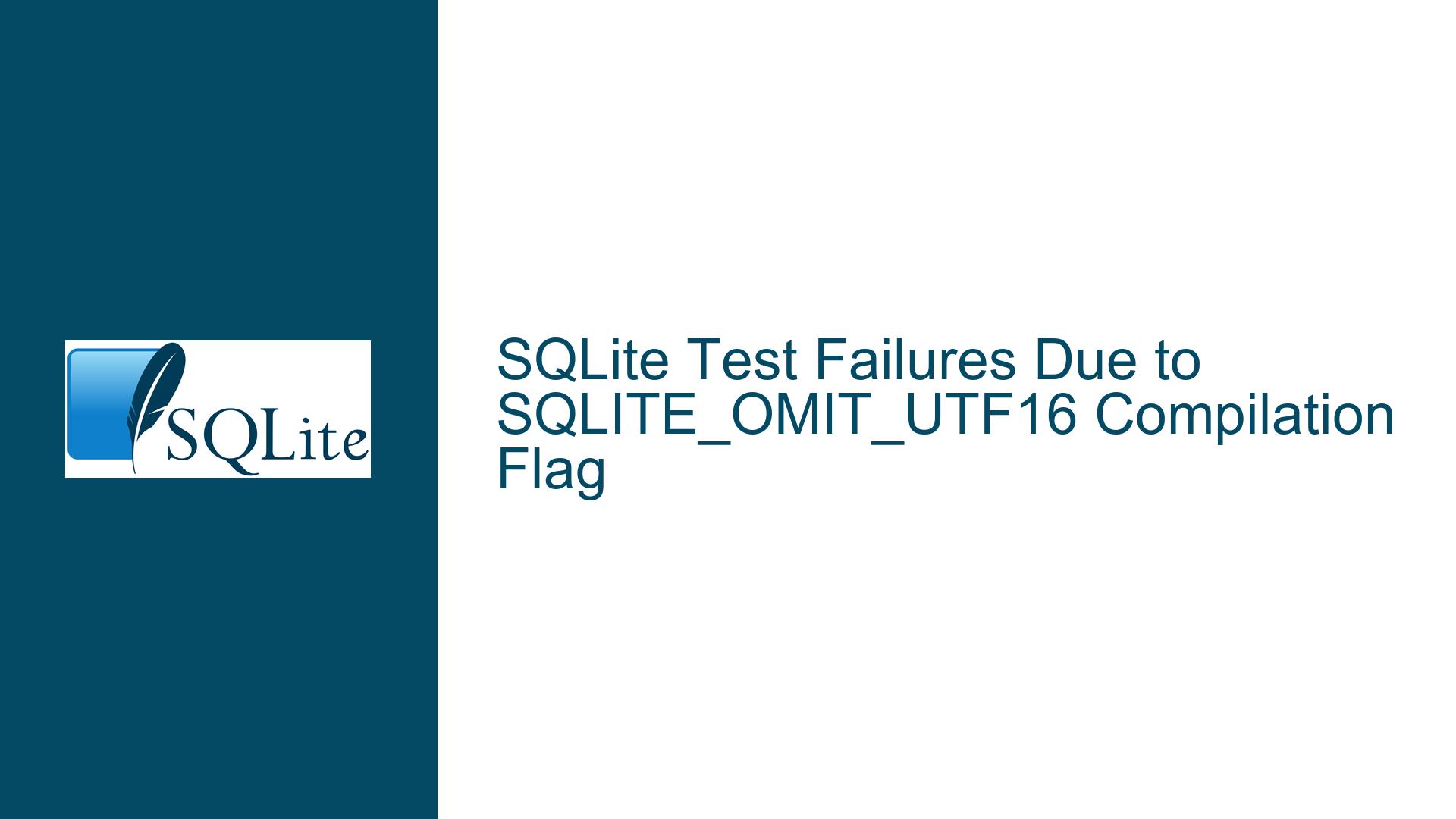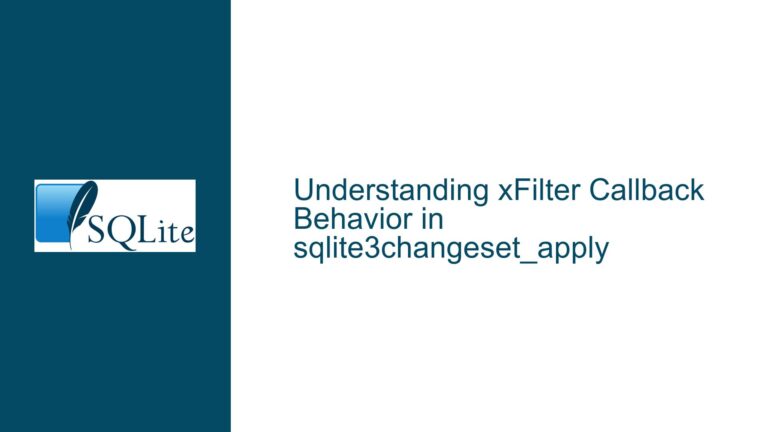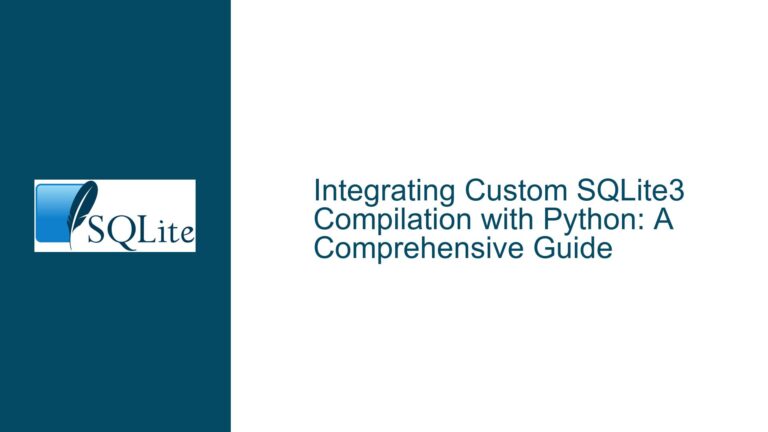SQLite Test Failures Due to SQLITE_OMIT_UTF16 Compilation Flag
SQLITE_OMIT_UTF16 Compilation Flag Causing Test Failures in numcast.test, pragma4.test, skipscan5.test, and trace3.test
The SQLITE_OMIT_UTF16 compilation flag is designed to exclude UTF-16 encoding support from the SQLite library, which can reduce the binary size and optimize performance for applications that do not require UTF-16 functionality. However, enabling this flag can lead to unexpected test failures in several SQLite test cases, including numcast.test, pragma4.test, skipscan5.test, and trace3.test. These failures manifest as discrepancies between expected and actual results, often involving string encoding, collation, and SQL query execution.
The numcast.test failures indicate that the test cases expecting UTF-8, UTF-16LE, and UTF-16BE encodings are not being handled correctly when SQLITE_OMIT_UTF16 is enabled. Specifically, the test cases numcast-utf8.0, numcast-utf16le.0, and numcast-utf16be.0 fail because the expected encoding results are not being returned. Instead, the results are empty, suggesting that the encoding-related functionality is either missing or incorrectly implemented when UTF-16 support is omitted.
Similarly, the pragma4.test failure in pragma4-1.12.1 shows a mismatch between the expected value [1] and the actual value [0]. This suggests that certain pragma settings or behaviors are affected by the absence of UTF-16 support, potentially due to internal dependencies on encoding-related functions.
The skipscan5.test failure is more complex, involving an invalid command name "add_test_collate" during the execution of the test script. This error occurs because the test attempts to set up a collation sequence using UTF-16 encoding, which is not available when SQLITE_OMIT_UTF16 is enabled. The absence of UTF-16 support prevents the test from executing the necessary collation setup, leading to a failure in the test script.
Finally, the trace3.test failure in trace3-8.7 reveals a discrepancy in the expected and actual SQL query results. The test expects a query with a string comparison (WHERE b = ‘hi’), but the actual query uses a numeric comparison (WHERE b = 123.0). This suggests that the SQLite engine’s handling of string literals and type conversion is being influenced by the absence of UTF-16 support, leading to incorrect query generation or execution.
Interrupted Encoding and Collation Functionality Due to SQLITE_OMIT_UTF16
The root cause of these test failures lies in the interruption of encoding and collation functionality when the SQLITE_OMIT_UTF16 flag is enabled. SQLite relies on UTF-16 support for various internal operations, including string encoding, collation sequences, and certain SQL functions. When UTF-16 support is omitted, these operations may not function as intended, leading to unexpected behavior and test failures.
In the case of numcast.test, the test cases are designed to verify the correct handling of different string encodings, including UTF-8, UTF-16LE, and UTF-16BE. When SQLITE_OMIT_UTF16 is enabled, the UTF-16-related functionality is removed, causing the test cases to fail because the expected encoding results cannot be produced. This is particularly evident in the numcast-utf8.0, numcast-utf16le.0, and numcast-utf16be.0 test cases, where the expected encoding results are not returned.
The pragma4.test failure in pragma4-1.12.1 is likely due to the absence of UTF-16 support affecting the behavior of certain pragma settings. Pragma settings in SQLite can influence various aspects of the database engine, including encoding, collation, and query execution. When UTF-16 support is omitted, these settings may not behave as expected, leading to discrepancies between expected and actual results.
The skipscan5.test failure is caused by the absence of UTF-16 support preventing the test from setting up the necessary collation sequences. The test script attempts to use the "add_test_collate" command to configure a collation sequence using UTF-16 encoding, but this command is not available when SQLITE_OMIT_UTF16 is enabled. As a result, the test script fails, and the collation sequence cannot be established, leading to incorrect query execution.
The trace3.test failure in trace3-8.7 is a result of the SQLite engine’s handling of string literals and type conversion being affected by the absence of UTF-16 support. When UTF-16 support is omitted, the engine may not correctly interpret string literals or perform type conversion, leading to incorrect query generation or execution. This is evident in the discrepancy between the expected query (WHERE b = ‘hi’) and the actual query (WHERE b = 123.0).
Implementing Conditional Compilation and Test Case Adjustments for SQLITE_OMIT_UTF16
To address these test failures, it is necessary to implement conditional compilation and adjust the affected test cases to account for the absence of UTF-16 support when SQLITE_OMIT_UTF16 is enabled. This involves modifying the test cases to handle the lack of UTF-16 functionality and ensuring that the SQLite engine can still function correctly without UTF-16 support.
For numcast.test, the test cases should be adjusted to account for the absence of UTF-16 support. This can be done by adding conditional checks to skip the UTF-16-related test cases when SQLITE_OMIT_UTF16 is enabled. Additionally, the test cases should be modified to verify the correct handling of UTF-8 encoding, which should still be supported even when UTF-16 is omitted.
In the case of pragma4.test, the test cases should be reviewed to identify any dependencies on UTF-16 support. If certain pragma settings rely on UTF-16 functionality, these settings should be adjusted or skipped when SQLITE_OMIT_UTF16 is enabled. This will ensure that the test cases can still verify the correct behavior of the remaining pragma settings without relying on UTF-16 support.
For skipscan5.test, the test script should be modified to handle the absence of the "add_test_collate" command when SQLITE_OMIT_UTF16 is enabled. This can be done by adding conditional checks to skip the collation setup for UTF-16 encoding and only configure collation sequences for UTF-8 encoding. This will allow the test to continue executing without relying on UTF-16 support.
Finally, for trace3.test, the test cases should be adjusted to account for the potential impact of the absence of UTF-16 support on string literal handling and type conversion. This may involve modifying the expected query results to reflect the changes in query generation or execution when UTF-16 support is omitted. Additionally, the test cases should be reviewed to ensure that they are not relying on UTF-16-specific behavior that may not be available when SQLITE_OMIT_UTF16 is enabled.
By implementing these changes, the SQLite test suite can be made more robust and capable of handling the absence of UTF-16 support when SQLITE_OMIT_UTF16 is enabled. This will ensure that the SQLite engine can still function correctly in environments where UTF-16 support is not required, while also maintaining the integrity of the test suite.






